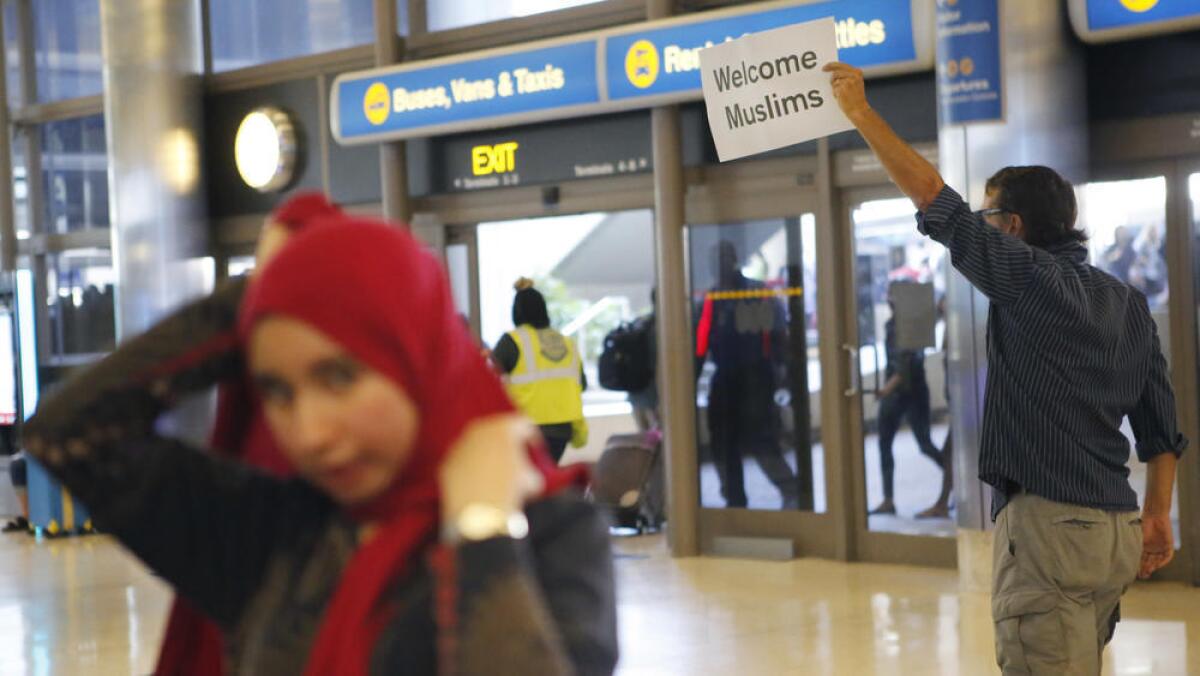Appeals court rejects Hawaii’s request to let grandparents and other relatives bypass travel ban

The U.S. 9th Circuit Court of Appeals on Friday rejected a request from the state of Hawaii to expand the number of people who can bypass President Trump’s travel ban, dealing one of the main challengers to the president’s executive order two court losses in two days as it fights to minimize the ban’s effect on travelers.
The order from the appeals court came a day after a Honolulu-based federal district judge denied the same request, saying he would not “usurp” Supreme Court orders that had revived a limited version of the travel ban.
In its order, a panel of three 9th Circuit judges said they “do not fault” the Hawaii judge for rejecting the state’s claim against how the ban is being implemented.
The judges suggested that the ban’s challengers made a technical mistake in their filing in Honolulu when they asked U.S. District Judge Derrick Watson to “clarify” the Supreme Court’s instructions on the ban, instead of asking for “injunctive relief or to modify the injunction” of the travel ban.
“Although the district court may not have authority to clarify an order of the Supreme Court, it does possess the ability to interpret and enforce the Supreme Court’s order, as well as the authority to enjoin against, for example, a party’s violation of the Supreme Court’s order,” the judges wrote.
The judges — Michael Hawkins, Ronald Gould and Richard Paez — were appointed by Democratic presidents and had previously refused to reinstate the ban in June before the Supreme Court took over the case.
In his order on Thursday, Watson said those challenging the ban need to go to the Supreme Court to get clarification on whether the government is appropriately implementing it.
But in its appeal to the 9th Circuit, the state of Hawaii said that Watson was “simply incorrect.”
At issue is which refugees and visitors to the United States can sidestep the ban — and how to determine whether such people have “close” relatives living in the United States or are associated with the country in other ways that let them bypass the ban.
Although Trump’s executive order halts travel by nationals of six majority-Muslim countries and refugee resettlement from all places, it provides exceptions for those with what the Supreme Court called “bona fide” connections with the United States, such as a parent, spouse, child, adult son or daughter, son-in-law, daughter-in-law, sibling, fiance or fiancee, and in-law parents.
But the administration blocked grandparents, grandchildren, aunts, uncles, nieces, nephews, cousins, brothers- and sisters-in-law. Travel ban challengers asked Watson to force the government to count all of those categories as “bona fide” U.S. connections.
Ban opponents also argue that a resettlement group’s interactions with a refugee constitute a bona fide relationship. The administration argues otherwise.
The Trump administration indicated after the Hawaii judge’s order that it was celebrating another court win after a series of losses over the travel ban.
“If the plaintiffs elect to proceed, we are confident that the U.S. Supreme Court will again vindicate the president and his constitutional duty to protect the national security of the United States,” the department said in a statement Thursday.
The ban, which puts a three-month pause on travel to the United States by nationals of Syria, Sudan, Somalia, Libya, Iran and Yemen and a four-month halt to all refugee resettlement, had been blocked by federal judges since an original version of it was signed in January.
Those judges included Watson, who ruled against the ban in a March case filed by the state of Hawaii. Trump administration losses in that case and another filed in a Maryland federal court were upheld in the 9th Circuit and 4th Circuit appellate courts before requests were made to the Supreme Court to rule on the constitutionality of the ban.
On June 26, the Supreme Court said the ban could be put back into place with exceptions. The court suggested its move was a compromise before it heard full arguments on Trump’s executive order in the fall.
“We are now in the middle of a 90-day partial travel ban. The Trump administration has reserved the option to extend or even expand the travel ban at the end of it. Many felt the balance struck by the Supreme Court was nuanced and fairly reasonable, but the Trump administration has flouted the Supreme Court’s order from the start,” Hawaii Atty. Gen. Douglas Chin said in a statement after the state filed its appeal. “What happens in the next several weeks matters a lot if the administration is not subject to the checks and balances of the courts.”
Hawaii and other travel ban opponents argue that the ban unconstitutionally discriminates against Muslims and is part of the president’s campaign promise to suspend all Muslim immigration. The Trump administration says the president is acting within his power to ensure national security while the government develops better vetting procedures for travelers from the countries, which it says have ties to terrorism.
Read the latest national headlines >> »
Jaweed Kaleem is the Los Angeles Times’ national race and justice correspondent. Follow him on Twitter, Facebook and Instagram.
ALSO
Trump’s polices were expected to hit the travel industry hard. That hasn’t exactly been the case
Who is in and who is out under the revived travel ban
Civil rights lawyers and protesters return to LAX as the new Trump travel ban takes effect
UPDATES:
4:20 p.m.: This article was updated to report an appeals court declined to take up Hawaii’s request to allow more people to be exempt from President Trump’s travel ban.
This article was originally published at 1:45 p.m.
More to Read
Sign up for Essential California
The most important California stories and recommendations in your inbox every morning.
You may occasionally receive promotional content from the Los Angeles Times.











